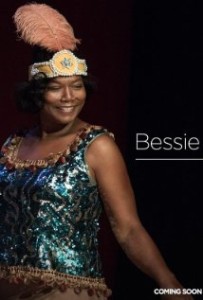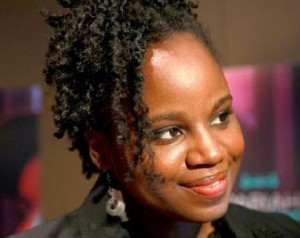I was invited to Frameline‘s preview showing of HBO’s upcoming film Bessie by Dee Rees and starring Queen Latifah at the Grand Lake Theater in Oakland last night. The theater was packed with lesbians including myself, Jan Corran, Eleanor Palacios and Miz Chris De la Rosa. Bessie Smith was a baddass and Queen Latifah is brilliant in the role. It is truly an inspiring and important film. When the lights went down in that gorgeous old theater, Queen Latifah came on screen to give all of us in Oakland a personal welcome. Bessie airs on HBO on May 16, and is a must see.
Writer/Director Dee Rees (Pariah) was eloquent during her Q&A after the film. She spoke about deriving inspiration from Angela Davis’ book Blues Legacies and Black Feminism. She believes Bessie Smith was a radical feminist before they had a name for it. As far as the music in the film, she didn’t want it to be a recounting of her top hits, but more of a vehicle to show what was going on in Bessie’s emotional inner life. Rees sees this as story about women: women loving each other—women challenging and competing with each other. She also addressed how Bessie’s tragic death is not part of the film and how she chose to “end it on a win”.
https://youtu.be/8FhmzwXfgz8
Epochalips staff writer and resident film expert Jan Corran gives her two cents:
Bessie Smith was a Blues legend in her time. She died in 1937. Simply said. But tonight, Bessie came alive as I sat at the Frameline/HBO private preview screening of Bessie, starring Queen Latifah as the alcoholic and tortured bisexual singer. Co-starring are Mo’Nique as Ma Rainey and Khandi Alexander as Viola, Bessie’s sister, who should get an Emmy along with Latifah for brilliant performances.
 My first encounter with Bessie Smith was watching a re-run of the only movie she did, St. Louis Blues. Like Ma Rainey, Ethel Waters and other glorious Black artists of the 1920’s, Smith was embraced by all segments of society, with the exception of the southern states at that time. She rose to great fame and fortune only to end her life much as it began when Ma Rainey helped make her a star. She returns to Ma Rainey and is welcomed like a mother welcomes a returning child.
My first encounter with Bessie Smith was watching a re-run of the only movie she did, St. Louis Blues. Like Ma Rainey, Ethel Waters and other glorious Black artists of the 1920’s, Smith was embraced by all segments of society, with the exception of the southern states at that time. She rose to great fame and fortune only to end her life much as it began when Ma Rainey helped make her a star. She returns to Ma Rainey and is welcomed like a mother welcomes a returning child.
In one spellbinding moment Latifah sits naked in front of a mirror slowly removing the wig, the eyelashes, the mask behind which a lifetime of loss and lament sits. With her body glistening in the softness of night, her nakedness is the frame for her face. There is a sadness and hollowness etched on her face that tells a story that no words could ever convey. We feel her. Our empathy rises.
Latifah and Bessie are one. For two magical hours, the audience is pulled into her world. It is a world of childhood memories that haunt her at every turn. It is a volatile world where Bessie can stand toe to toe with any street fighter. She loves women and men with passion and fire. It is the person who becomes her lover and not the gender. She makes love hard and fights hard. Latifah displays both as though she is channeling Bessie Smith. And I think she is.
Award winning writer and director Dee Rees was on hand to receive a resounding ovation for what we found out was a twenty-year labor of love to bring this film to the screen. HBO has always been a champion of LGBTQ themed films and for this it too deserves our admiration and kudos.
Another view from Miz Chris De la Rosa:
How do you know when you watched an incredible movie? When you wake up the next moring still thinking aboutr all the themes in the movie and are still moved by them. Bessie, written and directed by Dee Rees for HBO is one of those movies. There is a scene so beautifully and unapologetically shot (and when you watch it you will know which one I mean but I won’t give it away here) that it literally took my breath away. The story itself is expertly written and acted. I think Queen Latifah and Mo’Nique should win every award available to them for their portrayals of Ma Rainey and Bessie Smith, they both were sublime. I can’t gush enough about this movie except to say watch it—it is so incredibly good!

Dee Rees
More from Director Dee Rees from a recent interview in Huff Post Gay Voices: “While black Americans still grappled with oppression within a multitude of arenas in the early 1900s, the abolition of slavery finally allowed them to have control of their sexual relationships… Things [hadn’t] really changed for black people, but the two things people did have now were your sexual freedom and geographic mobility. And so I think people were really harnessing the two things that they did have. So economically, things were still depressed. Socially, things were still depressed, but you have freedom of who you love and freedom over where you go — or more than you used to. And so I think it was kind of representative of the times that they lived and having these new liberties. They wanted to exercise them to the fullest.”
____________________________________________________________
Like this article? Sign up here for our amazing Epochalips eMagazine and we’ll keep you up to date on what’s new and exciting in our world!



Dare I say that the Grand Lake Theater was packed with bisexual women to watch the lives of two fierce bisexual women. Bessie and Ma Rainey loved women and men. I can’t wait to see it myself. thanks for the great review.
Love it! Thank you Lani